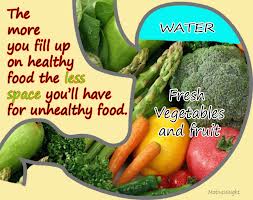Many books have been written concerning diet. What is a good diet? Is there a perfect diet? Is there a diet everyone should follow?
When I was in school an instructor challenged us; "You can make any statement about diet, even an outrageous one, and I will find an authority who agrees with you and one who disagrees." He defined an authority as anyone who has written a book. Believe me, after over 25 years in practice I know, for the layperson, diet can be very confusing. It can be confusing for a lot of doctors as well. The one law concerning diet that few will disagree with is "all things in moderation."
WE ARE DIFFERENT
Over the years, as the effects that food has on individuals has been studied, we have noticed that certain foods will have a unique effect on a persons moods and physiology. Mothers have seen that sweets might make one of their children hyperactive and another child moody or depressed. Foods do not have a universal affect on individuals, the facts are different foods affect people in different ways. So if individuals have different metabolisms than they have different dietary needs. If we were all exactly the same then one perfect diet might be the answer.
The fact is we are individuals, different types of music affect different people in a unique way. For some people like one type of music, some another. To think one diet will fit all makes as much sense as thinking one type of music will be enjoyed by all. At Keefe Clinic we attempt to understand how each patient is unique. There is absolutely no way one diet can be right for all people. Yet for the last several years a low-fat, high complex carbohydrate diet has been pushed on the general public.
The Low-Fat Diet Can Kill
In April 1996 the Second International Symposium on Dietary Fats and Oil Consumption in health and disease was hosted by the Southwestern University Medical School in Dallas, Texas. Nutritional researchers from around the world presented their findings on the effects of fat in the human diet. After the presentations showing the subjects following the low-fat, high complex carbohydrate diet hadn't got rid of their obesity, had not lowered their cholesterol levels, had lowered their HDL levels (the good cholesterol), and had increased their blood levels of triglycerides (a major risk factor for heart disease), the moderators of the symposium pronounced the low-fat diet a failure.
Now some people who have followed the low-fat diet have benefited. Those individuals have lost weight, lowered their cholesterol and blood sugar, and have extended their lifespan. But when you get a massive study of the population as a whole, the good is far outweigh by the number of individuals that have been hurt. Some metabolisms need a low-fat diet; some metabolisms need a high protein diet. Some metabolisms need to stay away from red meat. Some metabolisms should have red meat on a regular basis. Some people like classical music, some people like rock-and-roll. Just as our auditory needs are different our chemical needs are different.
Before Heart Disease Was So Common
In 1910 we consumed 83% of our fat as animal fat and only 17% as vegetable fat, and practically all of that came from eating the actual vegetables. Now, we get three times the amount of vegetable fat we did then, and a little more than half the animal fat. And we have added a new kind of fat; unnatural, processed fat called Trans fat, to the mix. Trans fat, widely used for baking, turned up in all kinds of processed foods; unfortunately, according to the Second National Health in Nutrition Examination Survey done nearly 20 years ago, the largest contributions of calories in the U.S. diet are white bread, rolls, crackers, doughnuts, cookies, and cakes, so we consume-at least those of us who follow the typical American diet-a hefty dose of these unnatural fats. In order to avoid Trans fats, it's important to look for the words partially hydrogenated and avoid any products that contain them.
There are some universal truths: eat real foods. It's possible today to have a meal that consists of very little real foods. Try to eat something fresh and raw everyday, fiber is an essential element to good health and raw foods are full fiber, as well as, vitamins, minerals and enzymes. Junk food got its name because it's primarily junk. Garbage in-garbage out, a computer law that's true for our bodies as well.
The Water Cure
New research links dehydration with a number of common diseases. Are you dying of thirst? Forty percent of your body weight in ozs. is the minimum of water you should drink everyday, 50 percent is your cleansing dose. If your weight is 100lbs. you need to drink 40-50ozs. of water every day. Your body is 75 percent water; your brain is 85 percent water, you need to replace this with clean water everyday. As we get older our sense of thirst gradually decreases which can lead to our bodies becoming chronically and increasingly dehydrated.
The Nature Cure
How about fresh air and sunlight. Our bodies need these elements as well. Indoor air has concentrated pollutants that can effect our health. Get outside and enjoy God's creation. Today we hear a lot about the dangers of sunlight. We are told that the ozone layer is opening and we are being exposed to more harmful rays of the sun. To that I say, "junk science". The sun has not changed, we have. We do not eat enough foods that have the antioxidants that protect us from the sun. We are exposed to more toxins that deplete us of antioxidants and so we have more skin cancer. Eat your vegetables and enjoy the sunlight, remember all things in moderation.
Knowing Your Body
There are four distinct body types with many subgroups. The different body types have differing chemistry related to which organ is the most dominant. The types include Thyroid, Adrenal, Gonadal (sex glands), and Pituitary. In men the Adrenal and Gonadal are combined in the Adrenal type.
The ratio of proteins, carbohydrates and fats differ for each type. The Thyroid type and Pituitary type require a lot of proteins whereas the Adrenal type and Gonadal type require a lot of complex carbohydrates. Too much fat can cause problems for Adrenal type and Gonadal type. The Thyroid type and Pituitary type can handle fats pretty well but carbohydrates would put their metabolisms under a lot of stress.
Learning what ratio of proteins, carbohydrates and fats that work best in your system will go a long way in balancing your body's chemistry. Each body type has certain foods that pose particular health risks for them. Understanding this information and realizing how your body type is genetically wired can give you a handle on your health for the rest of your life.
Filling out a simple form will help us determine which body type you are. Knowledge is power.
VISIT: www.facebook.com/KeefeClinic













